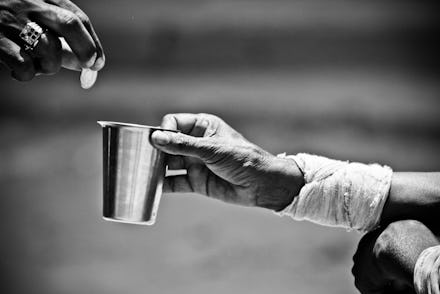New Data Shows Americans Still Believe the Biggest Myth About Inequality

Nearly 1 in 4 Americans say the poor need to "work harder" if the U.S. is going to slow its growing rate of economic inequality, according to a new Pew poll.
Of the 44 countries surveyed, only Nicaragua, at 31%, had more respondents cite laziness as the primary obstacle holding back the lower classes. Among "advanced economies," only the British matched the U.S. at 24%. The median for those 10 nations — France, Germany, and Japan among them — was less than half that number, 11%.
Many Americans continue to believe, against evidence and reason, that earnings are tied to effort. Recent research like a National Bureau of Economic Research study referenced in the Wall Street Journal, found that "higher-educated (and therefore higher earning) Americans do indeed spend more time working and less time on leisure than poorer income groups. In fact, while income inequality may be growing, 'leisure inequality' — time spent on enjoyment — is growing as a mirror image, with the low earners gaining leisure and the high earners losing." (Emphasis ours.)
Absent from the study is any firm explanation about why the "low earners" have all these free hours, though the authors do allow that the unemployed and underemployed — that is, people who have wage-paying jobs but aren't offered as many hours as they'd like — might not actually be enjoying their "leisure time."
This runs parallel with the case of the "working poor," defined by the U.S. Bureau of Labor Statistics as people who keep a place in the workforce for more than half the year, but still don't register enough income to rise above the poverty line.
Here is how the University of California-Davis Center for Poverty Research described their frustration:
In 2012, 4.4 million people who usually work full-time were working poor. Of these, 84% experienced at least one labor market problem (unemployment, involuntary part-time employment or low wages (defined as less than $337.92 per week). Low earnings was the most common problem with 68% experiencing low earnings either alone or in combination with other labor market issues; 37% experienced unemployment either alone or in conjunction with other problems; and 12% experienced involuntary part-time work either alone or in combination.
So, why do nearly a quarter Americans polled by Pew believe that a lack of hard work is holding back the country's poor?
Part of the answer lies in the misleading or misguided reporting in the broader media. But the trouble runs deeper, down to a foundational belief shared by many Americans that anyone, with hard work and that celebrated "entrepreneurial spirit" can succeed.
The myth is also promoted by politicians from both major parties, who often embrace optimism at the expense of honesty, and end up saying things like, "We do not accept that ours will ever be a nation of haves and have-nots. We must always be a nation of haves and soon-to-haves." That was Indiana Gov. Mitch Daniels, a Republican, speaking after the president's 2012 State of the Union.
But until these talking points are shelved — they're used, now, for a reason — and Americans begin to pay more serious attention to economic policy and its effect on their pocketbooks, we're likely to go on blaming capitalism's natural victims.
h/t Washington Post